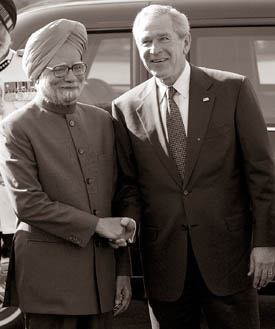|
dailynews |
|
|
|
|
|
OTHER LINKS |

|

|

|
High security throws life out of gearBUSH IN INDIA: For many years US officials described the Indian sub-continent the most dangerous place on earth.
For the three days that he was in India, life was thrown out of gear. Students writing their examinations had to negotiate blocked roads and oppressive security. People missed their appointments and flights too. Although President Bush was charm personified during his visit to Delhi, but this did not cut much ice with those citizens who had to suffer long traffic jams- as some roads were closed due to the presidential visit or due to demonstrations organized against him. US security experts had flown with their high tech equipment and their sniffer dogs to sanitise those areas where their president was visiting. The sniffer dogs, which stayed in some of the Delhi's five star hotels, were even taken around to Mahatma Gandhi's mausoleum, Rajghat, to ensure that there was no gunpowder in the final resting place of the apostle of peace. Their presence caused a national outrage and the parliamentary proceedings were disturbed on this issue.
"How could the dogs enter Rajghat," the MP's asked. The government is yet to respond to it. Questions have been raised about how much freedom a host country can give to the security of a visiting dignitary (read US). Heads of states from other countries trust Indian security, why doesn't US? Although there is real threat to his life, but that does not really mean that it contributes in compromising the sovereignty of the countries that he visits- all in the name of providing him 100 per cent security. In the name of providing security to their President, US officials end up controlling the local police too. Maybe this kind of close coordination is required to ensure that there are no gaps in presidential security, but it causes major tensions when they interface with the local people. Here is an example. On the day when Laura Bush was visiting one of the centres of missionaries of charity in south Delhi neighbourhood, a lady journalist opposed to the visit chose to hang a banner with a question emblazoned on it: " Laura why don't you get a picture taken with the maimed children of Iraq". A valid question in a democratic society, but the security personnel would have none of it. Local policemen on duty were allegedly instructed by the US officials to pull down the banner even when it was hanging from the lady journalist's balcony. There were scores of other incidents in Delhi and Hyderabad, where the police personnel had to be rough with the people protesting against President Bush's visit. In Hyderabad, where he went to spend time with young management students, there were thousands of agitators who were being tear gassed. Surely, these violent happenings would not have escaped the President or his handlers. Ideally, they would have liked a welcome that some of his predecessors got when they came to India- especially when they were signing a deal that promised to make India a nuclear superpower. President Eisenhower, for instance, drove in an open car from the airport to the President House. President Clinton, who came visiting in 2000, also had a greater public exposure. It is high time that President Bush and his advisors do a bit of introspection and figure out whether it is worth pursuing policies that alienate half the world. All the good work they may be doing in other areas gets swept away by a tidal wave of anger and resentment. Take for instance his trip to India and Pakistan. In the last three days, Indian government has been able to sign a deal with him, which should have been an occasion to burst firecrackers all over the country. After all, US, for its own tactical reasons, has chosen to wink at India's weapons program and its refusal to sign the nuclear non-proliferation treaty and still inked a deal with them. It may not have got the nuclear power status yet, but it is a matter of time when they get it. Besides they have been assured a regular supply of uranium from the nuclear suppliers group to run its power plants. This epoch making deal has raised hackles in US and UK, but Bush and his foreign policy advisors seemed unfazed by it and have assured the Indian government that they would get the deal ratified by the US Congress in three weeks time. A big achievement under all the circumstances, but Prime Minister Manmohan Singh is clearly on the defensive. Instead of being gung-ho about extracting some major concessions, he is going to spend better part of next week explaining to the left and Muslim leadership how they have managed to safeguard national interest and given into the exertions of a global bully. It matters a lot whom you deal with and how. US under security obsessed Bush surely cannot be. (The writer is the Editor of Hard-news India. He is a former Asiaweek correspondent) [email protected]. |
 Even though they stopped talking like this some years ago after India
and Pakistan backed off from an eyeball-to-eyeball confrontation and
began to smoke the peace pipe, US officials are still not willing to
take chances here. Their obsession for security came to the fore during
President George W Bush's recent visit to India.
Even though they stopped talking like this some years ago after India
and Pakistan backed off from an eyeball-to-eyeball confrontation and
began to smoke the peace pipe, US officials are still not willing to
take chances here. Their obsession for security came to the fore during
President George W Bush's recent visit to India. 


